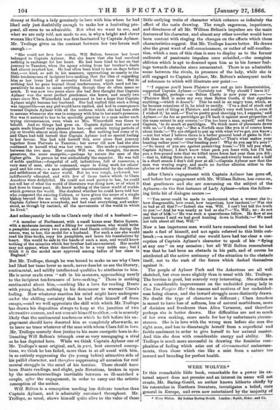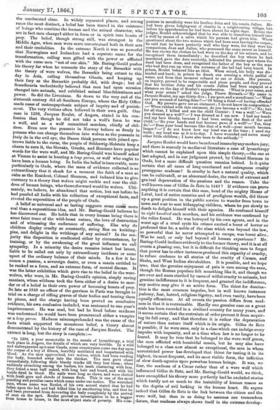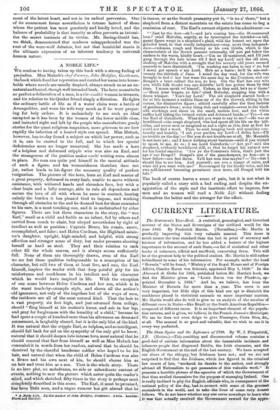WERE WOLVES.* IN this remarkable little book, remarkable for a
power its ex- ternal aspect does not promise and an interest its name will not create, Mr. Baring-Gould, an author known hitherto chiefly by his researches in Northern literature, investigates a belief, once general in Europe, and even now entertained by the majority of
• Were Ingres. By Sabine Baring-Gould, London; Smith, Elder, and Co.
the uneducated class. In widely separated places, and among races the most distinct, a belief has been traced in the existence of beings who combine the human and the animal character, who are in fact men changed either in form or in spirit into beasts of pray. The belief, though strong still, was strongest in the Middle Ages, when men were more unrestrained both in their acts and their credulities. In the extreme North it was so powerful that Norwegians and Icelanders had a separate name for the transformation, calling men gifted with the power or afflicted with the curse men "not of one skin." Mr. Baring-Gould pushes his theory far when he connects the story of the Berserkir with the theory of were wolves, the Berserkir being extant to this day in Asia, calling themselves Ghazis, and keeping up their fury as the Berserkir probably did, with drugs ; but all Scandinavia undoubtedly believed that men had upon occasion changed into animals, and exhibited animal bloodthirstiness and power. So did the Livonian.s. So down to the very end of the sixteenth century did all Southern Europe, where the Holy Office made cases of metempsychosis subject of inquiry and of punish- ment. The very victims often believed in their own guilt. One
man in 1598, Jacques Roulet, of Angers, stated in his con- fession that though he did not take a wolf's form he was
a wolf, and as a wolf committed murders, chiefly of chil- dren. Even now the peasants in Norway believe as firmly in persons who can change themselves into wolves as the peasants in Italy do in the evil eye, the Danes think persons with joined eye- brows liable to the curse, the people of Schleswig-Holstein keep a charm to care it, the Slovaks, Greeks, and Russians have popular words for the were wolf, and Mr. Baring-Gould was himself asked at Vienne to assist in hunting a loup garou, or wolf who ought to have been a human being. In India the belief is immovable, more particularly in Oude, where the mass of evidence collected is so extraordinary that it shook for a moment the faith of a man so calm as the Resident, Colonel Sleeman, and induced him to give currency to a theory that wolves might suckle and rear the chil- dren of human beings, who thenceforward would be wolves. Ulti- mately, we believe, he abandoned that notion, but not before he had puzzled all India with his collection of exceptional facts, and riveted the superstition of the people of Oude.
A belief so universal and ao lasting suggests some camas more real than a superstitious idea, and Mr. Baring-Gould believes he has discovered one. He holds that in every human being there is some faint trace of the wild-beast nature, the love of destruction and of witnessing the endurance of suffering. Else why do children display cruelty so constantly, string flies on knitting- pins, and delight in the writhings of any animal? In the ma- jority this disposition is eradicated either by circumstances, by training, or by the awakening of the great influence we call sympathy. In a minority the desire remains intact but latent, liable to be called out only by extraordinary incidents or some upset of the ordinary balance of their minds. In a few it be- comes a passion, a sovereign desire, or even a mania entitled to be ranked as a form, and an extreme form, of mental disease. It was the latter exhibition which gave rise to the belief in the were- wolves, who were, in Mr. Baring-Gould's opinion, simply raving maniacs, whose wildness took the form either of a desire to mur- der or of a belief in their own power of becoming beasts of prey. So late as 1848 an officer of the garrison in Paris was brought to trial on a charge of rifling graves of their bodies and tearing them
to pieces, and the charge having been proved on conclusive evidence, his own confession included, was sentenced to one year's imprisonment. He was mad, but had he lived before madness was understood he would have been pronounced either a vampire or a loup garou. Madness miscomprehendel was the cause of the facts which supported the monstrous belief, a theory almost demonstrated by the history of the case of Jacques Roulet. The extract is long, but the story is complete:— "In 1598, a year memorable in the annals of lycanthropy, a trial took place in Angers, the details of which are very terrible. In a wild and unfrequented spot near Cando, some countrymen came one day upon the corpse of a boy of fifteen, horribly mutilated and bespattered with blood. As the men approached, two wolves, which had been rending the body, bounded away into the thicket. The men gave chase immediately, following their bloody tracks till they lost them; when suddenly crouching among the bushes, his teeth chattering with fear, they found a man half naked, with long hair and beard, and with his hands dyed in blood. His nails were long as claws, and were clotted with fresh gore and shreds of human flesh. This is one of the most po771ing and peculiar cases which come under our notice. The wretched man, whose name was Roulet, of his own accord stated that he had fallen upon the lad and had killed him by smothering him, and that he had been prevented from devouring the body completely by the arrival of men on the spot. Roulet proved on investigation to be a beggar from house to house, in the most abject state of poverty. His com-
panions in mendicity were his brother John and his cousin Julien. Ho had been given lodging-out of charity in a neighbouring village, bat. before his apprehension he had been absent for eight days. Before the judges, Roulet acknowledged that he was able to transform himself into a wolf by means of a salve which his parents had given him. When. questioned about the two wolves which had been seen leaving the corpse, he said that he knew perfectly well who they were, for they were his companions, Jean and Julie; who possessed the same secret as himself. He was shown the clothes he had worn on the day of his seizure, and he recognized them immediately ; he described the boy whom he ha& murdered, gave the date correctly, indicated the precise spot where the deed had been done, and recognized the father of the boy as the man who had first ran up when the screams of the lad had been heard. In prison, Roulet behaved like an idiot. When seized, his belly was dis- tended and hard ; in prison he drank one evening a whole pailful oE water, and from that moment refused to eat or drink. His parents. on inquiry, proved to be respectable and pious people, and they proved that his brother John and his cousin Julien had been engaged at a distance on the day of Ronlet's apprehension. What is your name, and what your estate ?' asked the judge, Pierre Hdrault. My name is Jacques Roulet, my age thirty-five ; I am poor, and a mendicant.'—' What are you accused of having done ?'—' Of being a thief—of having offended God. My parents gave me an ointment ; I do not know its composition! When rubbed with this ointment, do you become a wolf ?'—' No; but for all that, I killed and ate the child Cornier : I was a wolf.'—' Were
you dressed as a wolf ?'—' I was dressed as I am now. I had my hands and my face bloody, because I had been eating the flesh of the said child.'—'Do your hands and feet become paws of a wolf?'—` Yes, they- do.'—' Does year head become like that of a wolf—your mouth become. larger ?'—' I do not know how my head was at the time ; I used my teeth ; my head was as it is to-day. I have wounded and eaten =an- other little children ; I have also been to the sabbathi' ".
Jacques Roulet would have been found in.sanebyany modern jury, and there is scarcely in mediaeval literature a case of lycanthropy which cannot be explained upon this simple theory,—the one at last adopted, and in our judgment proved, by Colonel Sleeman in Oude, but a more difficult question remains behind. Is it quite certain that all cases of long-continued and outrageous cruelty presuppose madness? Is cruelty in fact a natural quality, whiols
can be cultivated, or an abnormal desire, the result of extreme and gradual depravation of the-passions and the reason. Take the well known case of Gibes de Retz in 1440 ? If evidence can prove anything it is certain that this man, head of the mighty House of Lival, lord of entire counties and of prodigious wealth, did throw- up a great position in the public service to wander from town to
town and seat to seat kidnapping children, whom he put slowly to death to delight himself with their agonies. He confessed himself to eight hundred such murders, and his evidence was confirmed by the relics found. He was betrayed by his own agents, and in the worst age of a cruel cycle his crimes excited a burst of horror so profound that he, a noble of the class which was beyond the law, so powerful that he never attempted to escape, was burnt alive.. Was he mad, or only bad beyond all human experience ? Mr. Baring-Gould inclines evidently to the former theory, and it is at alI events a pleasing one, but it is difficult for thinking men to forget that power has in other instances produced this capacity of cruelty, to refuse credence to all stories of the cruelty of Caesars, and Shahs, and West Indian slaveholders. It is possible, and we hope true, that the genuine enjoyment of pain is rare among the sane,. though the Roman populace felt something like it, and though we are ever and anon startled by cases of wilful cruelty to animals, but genuine indifference to it is frequent, and granted the indifference„ any motive may give it an active form. The thirst for domina- tion is the most common impulse, but in well known instances jealousy, fear, hatred, religious bigotry, and even vanity, have been equally efficacious. At all events the passion differs from mad- ness in that it is restrainable. Hardly one genuine case on a great scale has been recorded in a civilized country for many years, and it seems certain that the restraints of order prevent it from acquir- ing its full sway, and that therefore it is rather the depravation of nature than nature itself which is its origin. Gilles de Retz is possible, if he were sane, only in a class which can indulge every impulse with impunity, and at a time when law is no longer to be feared. It may bs true that he belonged to the were-wolf genus,, the men afflicted with homicidal mania, but he may also have belonged to a class now almost as exceptional, the men in whom
unrestricted power has developed that thirst for testing it in its; highest, its most frequent, and its most visible form, the infliction
of slow death-agonies upon powerless human beings. It was, we fear, the madness of a Caesar rather than of a were wolf which influenced Gilles de Retz, and Mr. Baring-Gould would, we think,, have exemplified his theory more perfectly had he excluded stories which testify not so much to the instability of human reason as to the depths of evil lurking in the human heart. He argues indeed that Gilles de Retz is the link between the citizen and the were wolf, but then in so doing he assumes one tremendous datum, that madness always shows itself in the extreme develop- meat of the latent heart, and not in its radical perversion. One of its commonest forms nevertheless is intense hatred of those whom the patient has most genuinely and fondly loved, and the balance of probability is that insanity as often perverts as intensi- fies the secret instincts of its victim. Mr. Baring-Gould has, we think, demonstrated that madness misapprehended was the root of the were-wolf delusion, but not that homicidal mania is the ultimate expression of an inherent tendency in universal human nature.




































 Previous page
Previous page